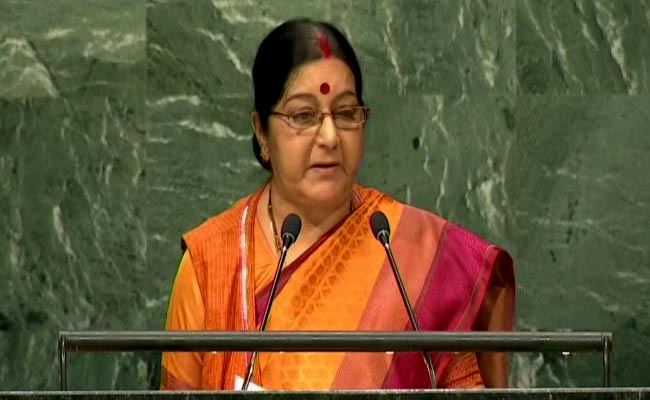NEW DELHI – India’s External Affairs Minister Sushma Swaraj claimed on Monday that Pakistan could not take the Kashmir issue to the International Court of Justice (ICJ) according to Shimla agreement and Lahore declaration.
Addressing a press meet on the three years of the NDA government, Sushma said the Kashmir problem can be solved only through direct talks between India and Pakistan and not through the involvement of any third party.
“The Kashmir issue can never be taken to ICJ because both the countries are bound by the Shimla Agreement and Lahore Declaration to solve it bilaterally,” she said.
Regarding the resumption of bilateral talks between the nuclear-armed neighbours, the minister responded that India wanted to sort out all issues with Pakistan through talks bilaterally and not through the mediation of any group, country or associations.
‘Talks and terror cannot go together. No flip-flop or one step forward-two steps backward’ she noted.
Recounting the Narendra Modi government’s efforts for a substantial dialogue with Pakistan, she said, “I went to the Heart of Asia conference in December 2015 and started bilateral talks. Then, PM Modi went to Lahore on December 25. Then the new year began with Pathankot. Won’t you take the changed circumstances into consideration?”
The legislator clarified that there was no possibility of any meeting between Prime Minister Nawaz Sharif and Narendra Modi during their visit in Kazakhstan this week.
“No meeting is scheduled either from their side or from our side,” she said.
It bears mentioning that Nawaz Sharif and Narendra Modi will both attend the Shanghai Cooperation Organisation (SCO) Summit on June 8-9 at Astana in Kazakhstan.
Pakistan-India ICJ Battle
Pakistan and India are currently part of a row at UN’s judicial organ ICJ regarding the death sentence of RAW agent Kulbhushan Jadhav.
The International Court of Justice had stayed the execution of Jadhav last month after he was awarded death sentence by Pakistan’s military after being charged with spying and carrying out subversive activities in Pakistan.
“Pakistan shall take necessary measures to ensure that Jadhav is not executed until the final decision in these proceedings and shall inform the court all the measures taken in implementation of the court’s order,” the order stated.
“India has the right to seek consular access for Jadhav,” it added.
The order was pronounced by Judge Ronny Abraham, President of the Court who noted that the case of Jadhav came under its jurisdiction due to the Vienna Convention, thus refuting Pakistan’s request, challenging its domain.
Following the decision, it was rumored that now Pakistan would move the same forum to reclaim its right over the restive region of Kashmir currently occupied by Indian troops.
Former Indian Chief Justice Markandey Katju’s viewpoint
Contrary to the popular belief being blown out of proportion in India, a former Chief Justice of India stated that the country had committed a mistake by going to International Court of Justice (ICJ) for Kulbhushan Jadhav case.
Ex-Indian Chief Justice Markandey Katju tweeted, “It was a serious mistake for India to go to ICJ on this issue, as now Pakistan can raise all kind of issues, particularly Kashmir.”
In a detailed Facebook post, the chief justice gave another perspective that Pakistan can now move UN’s judicial arm regarding the long-standing Kashmir conflict.
“Pakistan must be very happy that we went to the ICJ over a single individual’s fate, as now they can raise all kinds of issues, particularly Kashmir, in international fora, to which we had always objected till now. By going to the ICJ we may have opened up a Pandora’s box,” he wrote.
“We have played into Pakistan’s hands, and given it a handle to open up many other issues. In fact, that is why it seems that Pakistan did not seriously object to the jurisdiction of ICJ,” he observed.
Katju opined that after the Kulbhushan’s case Pakistan would approach the International Court of Justice seeking resolution of Kashmir issue and ‘it will then hardly lie in our mouth to object to the jurisdiction of ICJ’.














